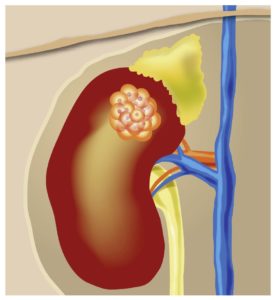What is kidney cancer?
Kidney cancer is a type of cancer that develops in the cells of the kidney.
There are several different types of kidney cancer, the most common being renal cell carcinoma (RCC). This accounts for about 85% of all kidney cancers. In RCC the cancerous cells originate in the lining (epithelium) of the kidney’s tubules; the small tubes inside the nephrons that filter blood and make urine.
There are also different sub-types of RCC, depending on which cells are affected or how the cells look under the microscope:
- Clear cell is the most common sub-type (65-70% of cases)
- Papillary (15%)
- Chromophobe (5-7%)
- Collecting duct carcinoma
- Renal medullary carcinoma
- Mucinous tubular and spindle cell carcinoma
- Renal translocation carcinoma
- Unclassified RCC (the latter five are very rare and make up the remaining 5-10% of RCC tumours)
- Hereditary kidney cancer (less than 5%).
Some kidney cancers (about 12% of the total) grow in the centre of the kidney where urine collects (called the renal pelvis) at the point where the kidney joins the ureter, a thin tube that carries urine from the kidney to the bladder. These are called transitional cell carcinoma (TCC) or urothelial carcinoma, and are similar to bladder cancer.
Less than 1% of kidney cancers are renal sarcomas, which originate in the connective tissues of the kidney.
Wilms’ tumour (or nephroblastoma) is a kidney cancer found in children, usually between the ages of 2 and 5.
Very rarely, a secondary tumour, called a metastasis, which has spread from a primary tumour elsewhere in the body, might be found on the kidney. In these cases, the cancer is not kidney cancer and needs to be treated accordingly.
Sometimes benign (not cancerous) tumours may grow on the kidney. These are called renal oncocytomas, and make up about 5% of all kidney tumours.
There are some significant differences in treatment for the various types and sub-types of kidney cancer. It is, therefore, important to know precisely what kind of kidney cancer has been diagnosed so you receive the right treatment. However, the vast majority of patients have the clear cell RCC.
References
Cancer Research UK: Kidney cancer
Macmillan: Kidney cancer
NHS: Kidney cancer
European Association of Urology (EAU) Renal Cell Carcinoma guidelines: 3. Epidemiology, aetiology and pathology
Further reading: Action Kidney Cancer Essential guide: Kidney cancer – Renal cell carcinoma (RCC)
Updated: October 2023 Next review: October 2025



